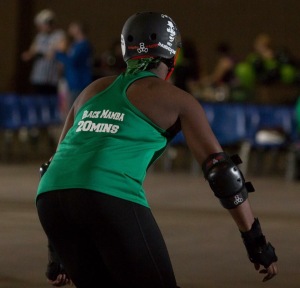You are about to become an athlete. Wait! Don’t freak out and run away. It is okay, it won’t happen overnight. And we will help you.
You will not be expected to bench press 250lbs and run a 4 minute mile on the first day. Probably not the last day either. But you are starting a journey that will change you. For some of you, this training may not be too strenuous at first. Perhaps you already work out on a regular basis. For some, this will be a whole new world of physical effort, not to mention a test of willpower.
 |
| Photo By KC Derby Digest |
While being athletic will help you during this training, willpower and determination are what makes you a roller derby skater. As Rocky said, “It ain’t how many times you get knocked down, it’s how many times you get back up.” And you are going to fall a lot, because falling means you are pushing yourself beyond your comfort zone and improving your skill. It also means that you are exposing your body to soreness and possibly getting hurt or injured.
Being sore after a workout is normal, it means you are pushing yourself a little further than you are used to. Your muscles respond to vigorous use by secreting Lactic acid during a workout. Lactic acid is what makes your muscles feel like they are burning while you are skating. Upping your exercise is what causes “micro tears” (these are considered a good thing in building muscle and are not to be confused with a large scale tissue tear which is an injury) in your muscles which, in turn, is what causes soreness after working out. One of the reasons you need to drink a lot of water and sometimes replenish electrolytes after skating is to help wash away the Lactic acid your muscles have expelled and help the muscle healing/inflammation process that occurs in the next 24-48 hours.
Once training starts, even if you already have a consistent workout regime, you will find that there are some derby specific drills that make your muscles sore – especially the muscles you didn’t even know you had! You might be tempted to skip Wednesday practices if Tuesday practice made you sore. We encourage you not to do this! First, you only get 2 chances to attend practice a week and skipping Wednesday practice takes away half of your opportunity to improve your skills. And second, you can work through the soreness by exercising the second day. The body is an amazingly adaptive structure that acclimates quickly to your new fitness level. Soon you will find that the muscle soreness and congestion is less and less after every work out, and you look forward to the second consecutive day of practice.
However, it is important to recognize the difference between normal soreness and a potential problem. You will no doubt wrestle with some issue or another connected with beginning a new exercise regime. The key is recognizing when you should push through and when you should stop, and you are the only judge on that. If something is sore, try to push through, but if you feel a sudden or sharp pain, or something that does not go away with rest, get yourself checked out.
The next level above soreness is being hurt. Hurt is generally short lived but intense. Hurt is different than sore because it is not a natural part of working out. Hurt means something has gone wrong temporarily, but you can probably treat it yourself. It hurts when you fall on your knees and the knee pad has slipped so instead of landing on padding you land on hard track, or perhaps you unintentionally land on your own skate. It doesn’t feel good and it causes you to stop and take a minute to recover but it generally won’t put you out of skating for the rest of the practice, or if it does, you will feel better pretty quickly and be back at practices soon.
Injured is different situation. Injured means something has gone wrong and generally has long term ramifications. Injured is a concussion, broken bone, torn ligament or the like. Injured puts you out of practice for more than a few days. You probably don’t need to be told that if you think you are injured you need to seek qualified medical help.
There is a fine line between hurt and injured and sometimes hurt starts out feeling like injured and vise-versa. The key is to listen to your body and know yourself. If you feel like something is wrong, it probably is and it is in your best interest to get it checked out. Better to be safe and catch a problem early when it can be handled on a small scale than to ignore the problem and have it turn into something that keeps you off skates for an extended time.
Be safe on the track! Make sure to give yourself a break when you sense that something doesn’t feel right. Don’t hesitate to let your coach or trainer know what is going on and ask for assistance if need be.


No comments:
Post a Comment
Leave us a message and we will get back to you as soon as possible.